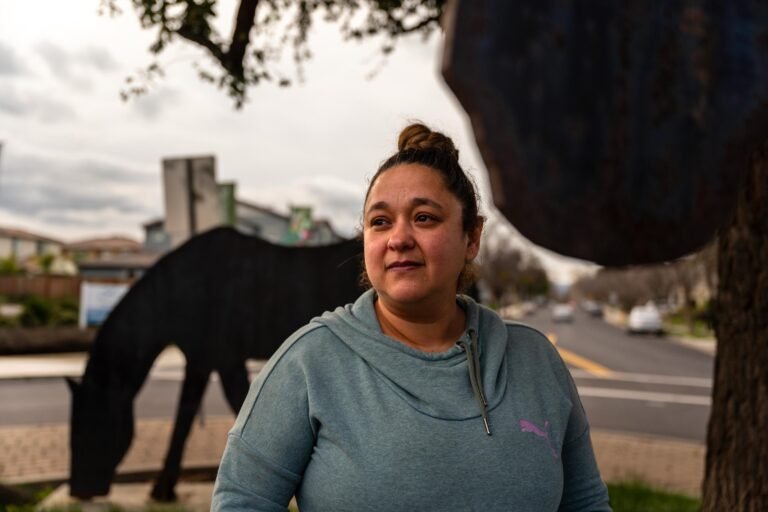Marisol Pantoja Toribio discovered a lump in her breast in early January. Uninsured and residing in California with out authorized standing and with out her household, the often happy-go-lucky 43-year-old rapidly realized how restricted her choices had been.
“I mentioned, ‘What am I going to do?’” she mentioned in Spanish, rapidly getting emotional. She instantly anxious she may need most cancers. “I went backwards and forwards — I’ve [cancer], I don’t have it, I’ve it, I don’t have it.” And if she was sick, she added, she wouldn’t have the ability to work or pay her lease. With out medical insurance, Pantoja Toribio couldn’t afford to seek out out if she had a severe situation.
Starting this yr, Medi-Cal, California’s Medicaid program, expanded to incorporate immigrants missing authorized residency, timing that might have labored out completely for Pantoja Toribio, who has lived within the Bay Space metropolis of Brentwood for 3 years. However her utility for Medi-Cal was rapidly rejected: As a farmworker incomes $16 an hour, her annual earnings of roughly $24,000 was too excessive to qualify for this system.
California is the primary state to broaden Medicaid to all qualifying adults no matter immigration standing, a transfer celebrated by well being advocates and political leaders throughout the state. However many immigrants with out everlasting authorized standing, particularly those that dwell in components of California the place the price of residing is highest, earn barely an excessive amount of cash to qualify for Medi-Cal.
The state is footing the invoice for the Medi-Cal enlargement, however federal regulation bars these it calls “undocumented” from receiving insurance coverage subsidies or different advantages from the Reasonably priced Care Act, leaving many employed however with out viable medical insurance choices.
Now, the identical well being advocates who fought for the Medi-Cal expansion say the following step in attaining well being fairness is increasing Coated California, the state’s ACA market, to all immigrant adults by passing AB 4.
“There are individuals on this state who work and are the spine of so many sectors of our economic system and contribute their labor and even taxes … however they’re locked out of our social security web,” mentioned Sarah Dar, coverage director on the California Immigrant Coverage Heart, one among two organizations sponsoring the invoice, dubbed #Health4All.
To qualify for Medi-Cal, a person can’t earn greater than 138% of the federal poverty degree, which at present quantities to just about $21,000 a yr for a single particular person. A household of three would wish to earn lower than $35,632 a yr.
For individuals above these thresholds, the Coated California market gives varied well being plans, usually with federal and state subsidies, yielding premiums as little as $10 a month. The hope is to create what advocates name a “mirror market” on the Coated California web site in order that immigrants no matter standing might be provided the identical well being plans that might be sponsored solely by the state.
Regardless of a Democratic supermajority within the legislature, the invoice would possibly battle to cross, with the state going through a projected price range deficit for subsequent yr of anyplace from $38 billion to $73 billion. Gov. Gavin Newsom and legislative leaders introduced a $17 billion package to start out lowering the hole, however vital spending cuts seem inevitable.
It’s not clear how a lot it will price to increase Coated California to all immigrants, in accordance with Meeting member Joaquin Arambula, the Fresno Democrat who launched the invoice.
The immigrant coverage heart estimates that organising {the marketplace} would price a minimum of $15 million. If the invoice passes, sponsors would then must safe funding for the subsidies, which might run into the billions of {dollars} yearly.
“It’s a robust time to be asking for brand new expenditures,” Dar mentioned. “The mirror market startup price is a comparatively very low quantity. So we’re hopeful that it’s nonetheless inside the realm of risk.”
Arambula mentioned he’s optimistic the state will proceed to steer in enhancing entry to well being take care of immigrants who lack authorized residency.
“I consider we are going to proceed to face up, as we’re working to make this a California for all,” he mentioned.
The invoice handed the Meeting final July on a 64-9 vote and now awaits motion by the Senate Appropriations Committee, Arambula’s workplace mentioned.
An estimated 520,000 individuals in California would qualify for a Coated California plan if not for his or her lack of authorized standing, in accordance with the labor analysis heart on the College of California-Berkeley. Pantoja Toribio, who emigrated alone from Mexico after leaving an abusive relationship, mentioned she was fortunate. She discovered about different well being care choices when she made her weekly go to to a meals pantry at Hijas del Campo, a Contra Costa County farmworker advocacy group, the place they instructed her she would possibly qualify for a plan for low-income individuals by Kaiser Permanente.
Pantoja Toribio utilized simply earlier than open enrollment closed on the finish of January. By means of the plan, she discovered that the lump in her breast was not cancerous.
“God heard me,” she mentioned. “Thank God.”
This text was produced by KFF Health News, which publishes California Healthline, an editorially impartial service of the California Health Care Foundation.

